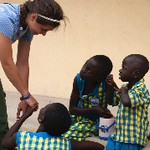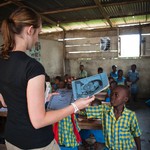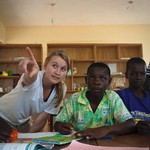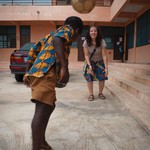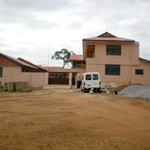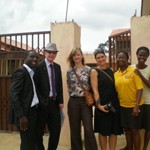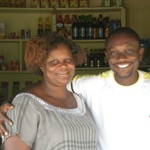Ghana Honors Service Learning Program
Ghana Honors Service Learning Program
By Joseph Verschaeve
Read stories from GVSU Ghana Honors Service Learning student participants: Ghana Student Blogs
INTRODUCTION
It is a priority for Grand Valley State University’s Frederik Meijer Honors College to increase the number of students studying abroad, preferably in service-learning opportunities in non-Western countries. After nearly four years of development, the Honors College offers a seven-week program each summer where students engage in service learning and cultural immersion in Ghana, West Africa. The program offers students the opportunity to learn about nongovernment (NGO) organizations and the Ghanaian culture while at the well-regarded University of Ghana. They begin their first week getting acclimated to and studying about NGO’s before traveling to the coastal village of Winneba, where they begin their work with the NGO Challenging Heights. This esteemed non-profit organization rescues children trafficked into slavery as innocent victims of the brutal, illegal fishing industry that exists in Ghana. Challenging Heights also provides shelter and rehabilitation to vulnerable children displaced by war in neighboring West African countries such as Liberia. Facilitating much of the service learning for GVSU students is Challenging Heights founder and recipient of the Frederick Douglass Freedom Award, James Kofi Annan. At the age of six, James Kofi Annan was sold into slavery. He worked in Ghana’s fishing villages for seventeen hours a day without adequate and reliable nutrition or shelter. Abuse was constant. Seven years later, James escaped from his tormentors and learned how to read and speak English. Years of struggle later James graduated from college becoming a financial manager at Barclay’s Bank in Accra. Born from his success, James created Challenging Heights in an effort to rescue the vast numbers of enslaved children living with the prospect of unrelenting abuse or even death. James Kofi Annan has much to teach our students and the world, for he refuses to allow slavery to define him. He has traveled vast social distances characterized by love and immense courage. James’ story inspires those whom he rescues and those who are drawn to understand his tremendous success. His friendship and fondness for GVSU learning community is evidenced by his annual visits to Allendale. The GVSU students are fortunate to have the opportunity to engage with James on his mission. A detailed biography can be found at https://www.freetheslaves.net/
BACKGROUND
The Ghana Honors Service Learning Program began in 2009 under the impetus and vision of Frederik Meijer Honors College Student Services Coordinator, Janaan Decker and Director, Jeff "Dr. J." Chamberlain. Decker has operated in Ghana for the past four years establishing relationships and allocating resources for our students. The development of this unique faculty led program is organized in order to ensure the consistency of service, education, and ambassadorship. Each year, new faculty are brought into the program to ensure continuity, train successors, complete ongoing projects, and develop new connections and initiatives. The faculty director for the 2010-11 Ghana Service Learning Program, Annis Water Resource Institute Senior Scientist, Rick Rediske, remains closely involved in the program. Professor Rediske continues to provide leadership with the ongoing GVSU clean water project as well as leadership across disciplines in the fight against human trafficking. The 2012-13 faculty director is GVSU social psychologist, Joe Verschaeve. Professor Verschaeve continues to work closely with Professor Rediske in continuing the work in water quality as well as to serve the program interests of Challenging Heights. Professor Mike Roskamp of GVSU’s Movement Science Department is slated to assume the faculty leadership role for the 2014 program. Upon successful completion of the program students earn six credits three of which are taken at the University of Ghana, Legon.
UNIVERSITY OF GHANA, LEGON
The intensive five-week service learning component to the program is sandwiched between one week of class at Legon. (Legon is synonymous with the University of Ghana, Legon means - hill of knowledge)and one week of debriefing and completion of coursework Students take ADMN 337 Management of NGO’s through the University of Ghana’s School of Business as an examination of how humanitarian aid is structured and delivered in West Africa. Subsequently, each student, no matter their major area of study, comes away with the tools needed to start and run their own nongovernmental organization. The course is taught by a professor of great renown, Justice Bawole. His course has been responsible for creating numerous successful aid organizations. Professor Bawole remains a highly reliable partner in GVSU’s efforts in Ghana.
GVSU IN WINNEBA - OUR FRIENDS AND PARTNERS
A Partnership - GVSU and Ghanaians: The work performed for the initiatives and projects listed in this report have garnered the attention of highly successful Ghanaians eager to develop partnerships. Students and faculty alike model engaged citizenship in the process of serving others in the Winneba community. Over the years of the program, GVSU students and faculty alike have built and maintained relationships through the Ghana Honors Service Learning Program (GHSLP) that have inspired deep learning and innovation for our students centered around the problem of human trafficking and child slavery. Supporters of GVSU’s efforts hold the privilege of bearing witness to the personal growth of our students as they confront real-world problems up close while providing carefully designed, judicious, and culturally appropriate service via intervention, prevention, and education. The overwhelming sense of friendship with our Ghanaian partners makes our service learning better and more meaningful. Because they are involved in deep learning, students are able to better see the world through the eyes of our partners and better able to assemble hope in challenging situations.
Cassava House Project: GVSU is serving the village of Atekjedo with the permission of Chief “Nana” Amponsah in both public health and human-trafficking prevention efforts. The project employs a micro-economic approach in supporting a small-scale cassava industry. GVSU has maintained a cassava grinder that was installed last year by engineering student, Ross Ezinga. In 2012 the program installed a cassava press so that the village can produce the cassava milk which is made into a highly marketable product in the form of glue. With these two devices the village can take dried and ground cassava flakes (garri) as well as glue to the market. We are establishing an external fund in order to build a cassava house in which to process the products.
Ghana National Health Service: Innovative service-learning options for GVSU students at Challenging Heights include teaching, outreach education for families, clean water and environmental initiatives, micro-economic sustainability, as well as health and medicine through the Ghana National Health Service. Dr. Luiz Amoussou, M.D., M.P.H. is the Director of Medicine for the Ghana National Health Service- Effutu Municipality. With his generous attention the Ghana National Health Service provides excellent service learning components for GVSU students in four hospitals and five outreach clinics in the Effutu Municipality. Further, the Ghana National Health Service provides opportunities for students to serve in clean water initiatives, maternal health and obstetrics, tropical medicine, malariology, H.I.V. /A.I.D.S., road traffic accidents not to mention an array of other initiatives aimed at health challenges. Biomedical students are introduced to the structure of Ghana National Health Service’s delivery systems along with the complex disease patterns that exist in West Africa. Students are offered service learning opportunities that encompass direct curative services to that of opportunities in prevention and education. As a result of the success of the 2012 program with both Challenging Heights and the Ghana National Health Service, GVSU students have formed the registered student organization, Challenging Heights USA- GVSU. In so doing, GVSU students have teamed up with Rays of Hope International of Grand Rapids, and are engaged in outfitting Holy Cross Hospital in Swedru, Ghana so that the children of the Hovde House will receive quality testing, diagnosis, treatment and intervention.
For more information on Rays of Hope International, please visit: https://www.raysoh.org/
The Hovde House and Challenging Heights School: The rescue center offers students the opportunities to help with basic health care, teach English, or work with social and medical workers. The Hovde House serves as the rescue center for children removed from slavery or armed conflict in West Africa. The center is a residential facility complete with a school (which is set in an undisclosed wilderness location) for security purposes. The facility, built by the private Hovde Foundation, houses up to 60 children. During the 2012 program there were 48 (44 boys: 4 Girls) newly rescued children ranging from age 5 to 18. These children arrive after years of severe abuse and disaffected with long histories of hopelessness under horrific circumstances. They come to the rescue center virtually “dead inside” since they have been victims of every kind of exploitation, subjugation and abuse that one can imagine. The main focus of the rescue center is to help the children to feel human again. Visitors are asked not to wave at the children when entering the rescue center, for some of them will think that they are about to be hit.
Hitting is unfortunately a very big part of their young lives. Subsequently, the children are placed in a learning module entitled, Hands Are Not For Hitting. Each child traces a picture of their hands and places them on the wall with all of the other little hands. This exercise, while seemingly simple, is rather complex. First, many of the children have severe fine motor deficits due to prolonged handling of fishing nets to the point where their neurology betrays them. Secondly, the act of tracing one’s hand is truly a challenge to accomplish with the other finger let alone a crayon. Finally, those who triumph in tracing their hands feel more validated in their own existence. The hand on the wall becomes evidence that they are actually alive, safe and with others. They are indeed some of the most vulnerable people on earth. Because of this James Kofi Annan insists that the children not allow slavery to define them —they are now free agents who can make much of their lives. They are taught the motto, “To Whom Much Is Given, Much Is Expected.”
Visit the Challenging Heights Facebook page at https://www.facebook.com/challengingheightsgvsu
FAMILY PARTNERS IN WINNEBA
The Keelson, Quaye, Afari and Mishiwo families have been highly skilled and reliable partners and hosts. They have generously given of their time and have provided trucks and personnel in the process of lending critical support to GVSU’s water and micro-economic enterprises. Further, Samuel Afari has lent his knowledge of local folkways in order to best communicate with villages vulnerable to human trafficking. He and Atta Keelson, both accountants, spend much time in villages teaching others how to retain surplus in order to grow small businesses. The Quaye’s offer short-term low interest micro- financing to upstart businesses.
Baffour Boaten Boahen-Boaten attended GVSU to study psychology in the Fall of 2011. Currently, he is doing his year of public service as a TA in the Psychology Department at the University of Cape Coast. He was also named as the overall best student in his graduating class and delivered the valedictory speech at the University of Cape Coast. Baffour served as an interpreter and guide for GVSU faculty and students for the 2012 trip. Baffour is truly a “Laker for a Lifetime.”

